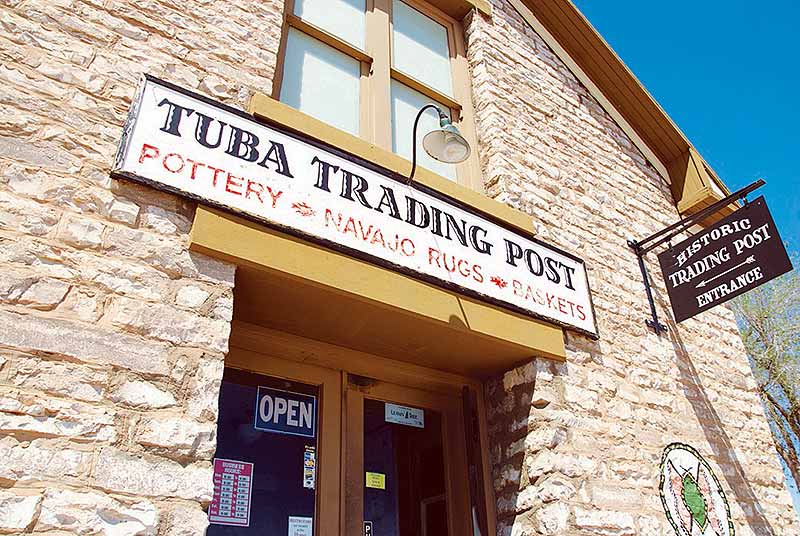
An archive of longings

Tuba City Trading Post in Tónaneesdizí is flavored more by the early twentieth century than today. Seventy-five percent of its customers are non-Native and 25 percent are Native. The decades old trading post carries arts and crafts, books, clothing, kachina dolls, Navajo jewelry and rugs, as well as other items. (Times photo – Krista Allen)
At trading post, customers have changed but service is the same

Tuba City Trading Post in Tónaneesdizí is flavored more by the early twentieth century than today. Seventy-five percent of its customers are non-Native and 25 percent are Native. The decades old trading post carries arts and crafts, books, clothing, kachina dolls, Navajo jewelry and rugs, as well as other items. (Times photo – Krista Allen)
TUBA CITY
The old photographs show two men, adorned in turquoise and wearing traditional Navajo outfits, letting their horses drink on one side while a woman weaves and a family poses outside their hogan on the other.

Tuba City Trading Post in Tónaneesdizí is flavored more by the early twentieth century than today. Seventy-five percent of its customers are non-Native and 25 percent are Native. The decades old trading post carries arts and crafts, books, clothing, kachina dolls, Navajo jewelry and rugs, as well as other items. (Times photo – Krista Allen)
The photographs of the Diné men, women and children on the walls at Tuba City Trading Post testify to time’s relentless melt. The subjects seem to savor life intensely, every hundredth of a second.
“At that time … there would be a lot coming in on the first with their nice jewelry – concho belt, bracelet,” said trading post manager Leo Joe Lee about the early fifties Diné people. “When I see them today –– one of them (elders) comes in, I always think about it.”
The trading post smells distinctly of leather. It’s evident that for Lee, the smell evokes memories of some of the best moments in Diné life. He remembers the men buying peanuts and a Coke.
It may have been a Southern tradition, but around here taking a few good swallows of Coke, then tearing off a corner of one of the single-serving bags of Tom’s toasted peanuts and making one hand into a funnel to pour the peanuts into the soda was a common sight among the Natives. It would fizz up for a few seconds, then they’d start drinking them down.
“Those two, they’d buy it, and go outside,” Lee said. “More than 10 people would be sitting out there, talking away, drinking soda and putting peanuts in (it).”
The trading post aura today is not the same as the golden days.
“It seem like at the time, in those days, it was more fun,” Lee said. “It was more interesting with people, all those straight hat and Navajo jewels. And their boots on and their pants cuffed.”
The trading post is an archive of longings. A longing for the old days tears Lee when he reminisces about the earlier Diné people. If one listens inside the trading post, the longing reveals its meaning: a longing for culture and tradition, for a memory of doing things differently, and for new metaphors for life.
To read the full article, pick up your copy of the Navajo Times at your nearest newsstand Thursday mornings!
Are you a digital subscriber? Read the most recent three weeks of stories by logging in to your online account.








 Highway 264,
Highway 264, I-40, WB @ Winslow
I-40, WB @ Winslow